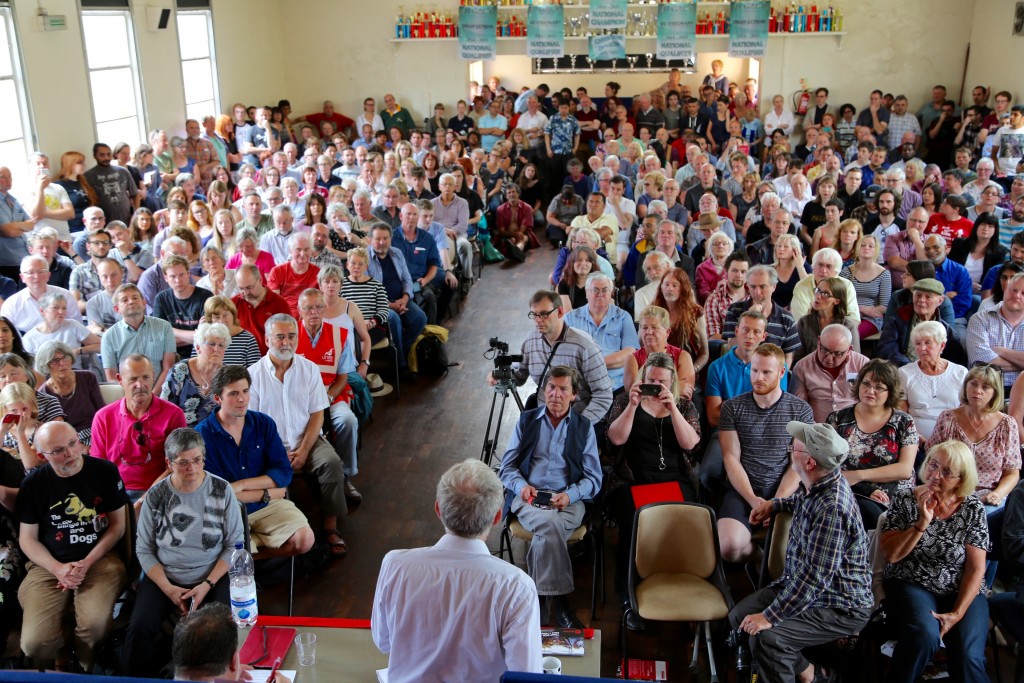The new leader of the UK’s second-biggest political party has some scary ideas about Israel and the Middle East. And his friends are even scarier.
Long before he thought he would ever become leader of Britain’s Labour Party, which he was overwhelmingly elected to lead on September 15 of this year, Jeremy Corbyn referred to the Islamist terrorist organizations Hamas and Hezbollah as his friends.
“It will be my pleasure and my honor to host an event in Parliament where our friends from Hezbollah will be speaking,” Corbyn said in a 2009 speech. “I’ve also invited friends from Hamas to come and speak as well. Unfortunately, the Israelis would not allow them to travel here so it’s going to be only friends from Hezbollah.”
“The idea that an organization that is dedicated towards the good of the Palestinian people and bringing about long-term peace and social justice and political justice in the whole region should be labeled a terrorist organization by the British government is really a big, big historical mistake,” Corbyn added. The government should “start talking directly to Hamas and Hezbollah,” he concluded, for it is the “only way to bring about peace.”
When challenged on national television this summer about his friendship with war criminals whose primary tactic is indiscriminately firing rockets at the homes of Israeli civilians, presumably as part of their commitment to peace and social justice, Corbyn exploded. He claimed that he merely used the term “friends” collectively, just as he would with anyone else; he did not agree with Hamas and Hezbollah. Corbyn also asserted that he has met with Israeli settlers and those from “the other side”—an assertion that has yet to be proven.
It seems that the new leader of the Labour Party is friends with two bloody organizations committed to erasing Israel from the map of the Middle East and whose Islamist values are ostensibly antithetical to his own. And this is, troublingly, only the tip of the iceberg. Throughout the Labour leadership campaign, Corbyn’s connections with anti-Semites, anti-Zionists, Islamists, terrorists, and Holocaust deniers were exposed in the British media. Each revelation only seemed to bolster the righteousness of his supporters, who turned Corbyn into a political phenomenon.
Jeremy Corbyn’s victory is deeply disturbing. It speaks to the ideological corruption of the Labour Party—traditionally an engine for the economic, social, and cultural betterment of the British people—and the collapse of its political center. The party has now been taken hostage by a tendency on the British Left that claims to be committed to free political and personal expression, while it ignores the concerns of Jews at home and abroad, and pledges alliance to every person, organization, and nation whose raison d’être is anti-American and anti-Israel. This includes everyone from Fidel Castro and Hugo Chavez to Vladimir Putin and, of course, the aforementioned Hezbollah and Hamas.
Philosophically juvenile and unserious, this tendency—with Corbyn as its public face—nevertheless has the potential to do a great deal of damage, especially to the Labour Party and its relationship with Israel and the British Jewish community.
Having spent several years working as a trade union organizer and representative on a local London council, Jeremy Corbyn was first elected to Parliament in the Labour fiefdom of Islington North in 1983. This was the same year Labour was shellacked by Margaret Thatcher’s Conservatives after running on a far-Left, anti-European, and anti-nuclear manifesto that was dubbed “the longest suicide note in history.” To his great credit, Corbyn has been a popular constituency MP, winning every race since 1987 with at least 50 percent of the vote.
Upon entering Parliament, Corbyn joined the Socialist Campaign Group, a far-Left faction within the Labour Party most closely associated with one of its founding members, the socialist campaigner and anti-war advocate Tony Benn. Opposed to the modernization efforts of Neil Kinnock and Tony Blair, Corbyn has been a perennial rebel and backbencher. He has never held a cabinet office and, as a result, cannot be held responsible for a single significant piece of legislation in his thirty-year career.
In 1984, Corbyn hosted two convicted Irish republican terrorists in Parliament just two weeks after the IRA bombed a hotel in Brighton in an attempt to assassinate the Prime Minister. A Guardian editorial in 1987 bemoaned Corbyn’s “pathetic romantic attachment to the Provisional IRA” and labeled him a “damned nuisance.” In the same year, Corbyn granted a researcher’s pass to Ronan Bennett, an IRA sympathizer who had been jailed for the murder of a police officer (and was later acquitted of that and other terrorist charges). After a vote, MPs prevented Corbyn from employing Bennett.
To this day, Corbyn refuses to condemn the terrorist actions of the IRA and recently appointed John McDonnell, who has suggested that members of the IRA should be “honored,” as his Shadow Chancellor of the Exchequer, the heir apparent to run Britain’s treasury should Labour take power.
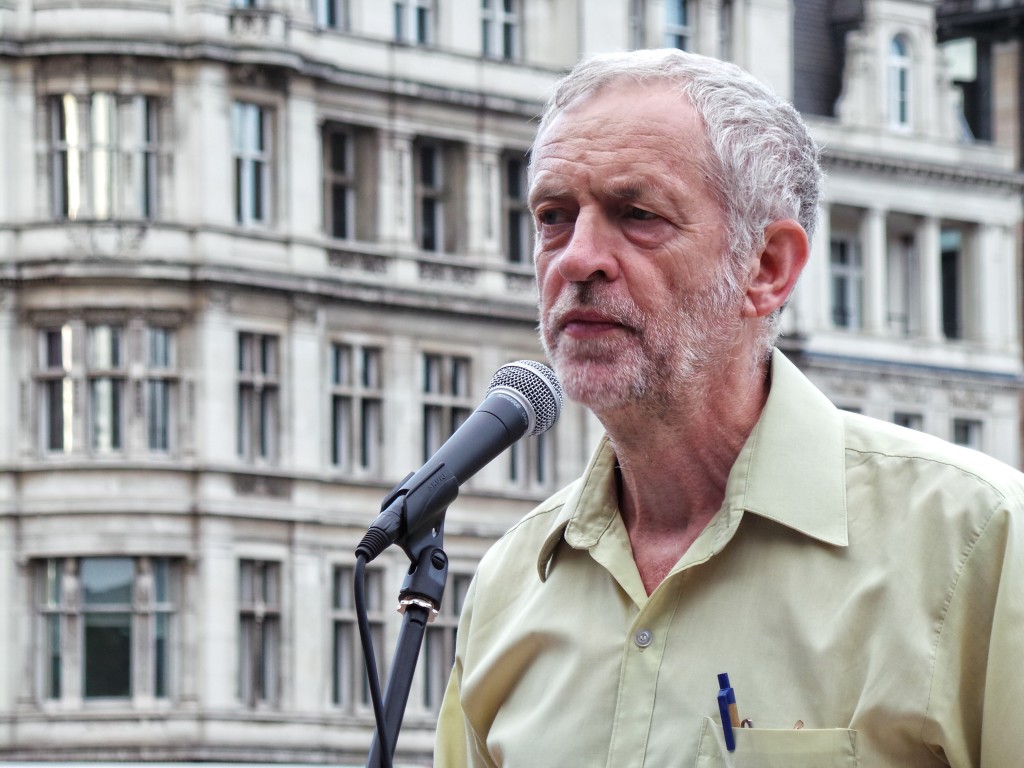
Jeremy Corbyn speaks at the No More War rally in 2014 in Parliament Square on the 100th anniversary of Britain joining World War I. Photo: Garry Knight / Wikimedia
An apologist and useful idiot for authoritarian regimes everywhere, Corbyn has yet to find an example of Western military intervention that suits him. He opposed international action against Saddam Hussein in 1990, Slobodan Milošević in Kosovo in 1998, the Taliban in Afghanistan in 2001, and Muammar Qaddafi in Libya in 2011. The chairman of Stop the War Coalition (which sponsors an annual anti-Israel rally in London), Corbyn seems alarmingly sanguine about armed conflict—whether it be in Syria or east Ukraine—provided it isn’t a liberal, humanitarian, or international effort to push back against brutal, genocidal regimes.
Corbyn continues to push the Russian line on Ukraine, which holds that Russia’s actions are justified due to NATO expansionism and encirclement, that Ukraine “has been put under enormous pressure to come into the EU and NATO military orbit,” and that there is substantial “far-Right and racist involvement in the [anti-Russian] uprising.” This shouldn’t be surprising, considering Corbyn’s involvement with Putin’s propaganda network, RT. He has been a frequent guest on that channel, just as he has on Iran’s Press TV and Qatar’s Al-Jazeera.
As the Left-wing political commentator James Bloodworth correctly observed, “The best case against Corbyn is not that he is a wild-eyed socialist, but [that] he is remarkably good at proffering apologetics for dictatorship and tyranny.”
Corbyn is a patron of the Palestine Solidarity Campaign (PSC), and support for the Palestinian liberation movement has been an ideological constant throughout his political career. During the leadership campaign, Corbyn said he supports “a meaningful peace process between Israelis and Palestinians,” ending in two states for two peoples based on the 1967 borders. But he is also in favor of the Palestinian right of return—a policy long popular with anti-Zionist movements since, in practical terms, its outcome if enacted would be the end of Israel as a Jewish state.
His time in the movement for Palestinian statehood has made him some unusual bedfellows. The PSC itself has a troubling history of publishing racist and anti-Semitic material, from defamatory cartoons to anti-Jewish conspiracy theories. At a recent rally outside Downing Street during Benjamin Netanyahu’s visit to London, a pro-Palestinian demonstrator waved a coin in front of supporters of Israel and said, “Here’s a penny. …That’s all you understand, money.” Guardian columnist and Corbyn supporter Owen Jones recently confessed that “While the vast majority of people involved in the movement are—like myself—driven by a passionate support for self-determination, there is a minority that indulges anti-Semitic tropes. These ideas have to be defeated.”
If only Corbyn himself would acknowledge this. He seems rather good at calling out anti-Semitism on the Right and, when addressing Jewish audiences, is always keen to note that his parents took part in the legendary 1936 Battle of Cable Street, in which anti-fascist activists faced down Oswald Mosley’s Blackshirts in east London. His great failure, however, is his inability to acknowledge anti-Semitism within his own camp—the political Left and the Palestinian solidarity movement. He is completely blind to it.
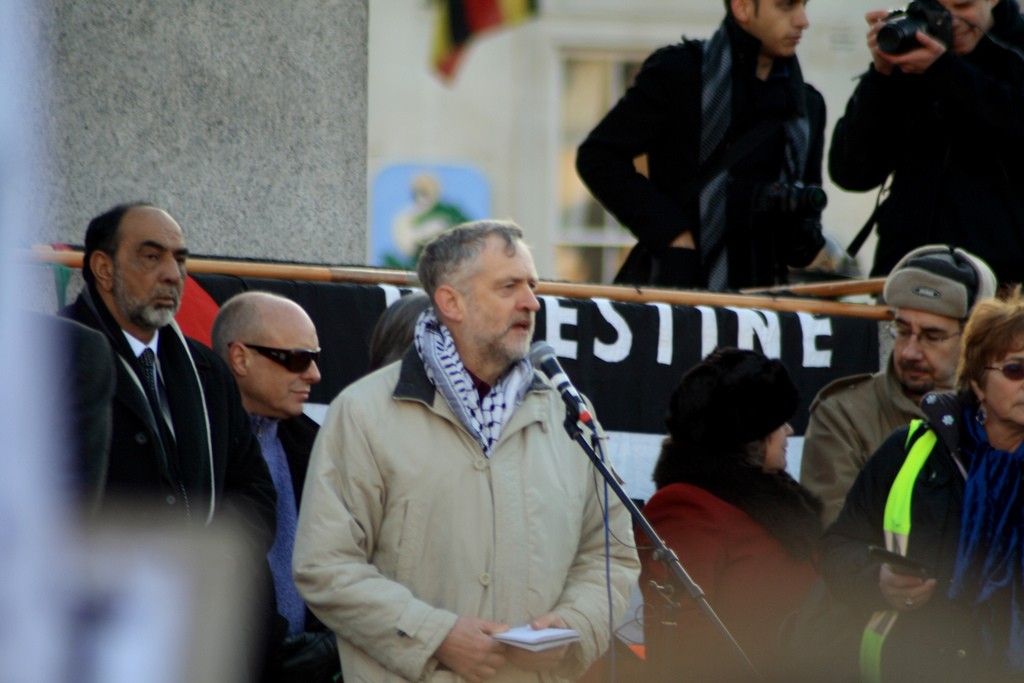
Jeremy Corbyn speaks at a 2009 pro-Palestinian rally in Trafalgar Square. Photo: Davide Simonetti / flickr
Corbyn was perfectly content, for example, to share a platform with the anti-Semitic Brazilian cartoonist Carlos Latuff at a conference that was due to take place in August. He only withdrew from the event when the media found out about it. In the past, Corbyn has defended the lunatic and patent nonsense person Reverend Stephen Sizer, who has posted material claiming Israeli links to 9/11 on his Facebook page. The London Evening Standard reported that Corbyn “wrote a letter during the controversy suggesting the Rev Sizer was ‘under attack’ because he had ‘dared to speak out against Zionism.’” Corbyn reportedly wrote that Sizer “seems to have come under attack by certain individuals intent on discrediting the excellent work that Stephen does in highlighting the injustices of the Palestinian-Israeli situation.”
In 2009, Corbyn met in Parliament and addressed an anti-war event with the Lebanese activist Dyab Abou Jahjah, who told a Flemish-language magazine in 2004, “Every dead American, British, and Dutch soldier is a victory.” Three years later, The Jewish Chronicle reported that Abou Jahjah “claimed to have published a picture of Anne Frank in bed with Adolf Hitler alongside the caption ‘put this in your diary, Anne.’” After his visit, he was banned from entering the United Kingdom due to his extremism.
Corbyn initially tried to claim that he had never met Abou Jahjah. When further evidence of their meeting emerged—a photograph tweeted by Abou Jahjah himself—he swiftly changed his tune and said he must have simply forgotten the whole thing. The volte-face was, as the Booker Prize-winning author Howard Jacobson rightly noted, careless and comical. “Mix less often with bombers and fanatics, Mr Corbyn, in places where bombers and fanatics are bound to congregate,” he wrote, “and the ones you do meet might linger longer in your mind.”
From IRA sympathizers to anti-Israel activists, Corbyn tends to be in the same room as bombers and fanatics because he invites them in. In 2012, Corbyn extended a hand to Raed Salah, a preacher of hate associated with the northern branch of the Islamic Movement in Israel.
“He is far from a dangerous man,” Corbyn posited rather oddly. “He is a very honored citizen. He represents his people extremely well and his is a voice that must be heard. …I hereby renew my invitation to Sheikh Salah to come to Parliament, meet with me, meet with my colleagues. You will be assured of a very warm welcome and I look forward to giving you tea on the terrace because you deserve it.”
Why Corbyn thought it would be appropriate to have tea with someone who, five years prior, reprised one of the oldest anti-Semitic slurs—the blood libel—is beyond comprehension. “We have never allowed ourselves, and listen well, we have never allowed ourselves to knead the blood of children into the bread with which we break the fast of the holy month of Ramadan. What would happen to some of the children of Europe whose blood was mixed into the holy bread?” Salah said in 2007. He has written of 9/11,
A suitable way was found to warn the 4,000 Jews who work every day at the Twin Towers to be absent from their work on September 11, 2001, and this is really what happened! Were 4,000 Jewish clerks absent [from their jobs] by chance, or was there another reason? At the same time, no such warning reached the 2,000 Muslims who worked every day in the Twin Towers, and therefore there were hundreds of Muslim victims.
As ever with such things, Corbyn is unwilling to give an honest accounting. During the campaign, Corbyn’s team claimed his characterization of Salah as an “honored citizen” was merely “a term of diplomacy as an aid to dialogue rather than a description of a relationship or an endorsement of a set of views.” Call me old-fashioned, but I’m not certain it’s entirely necessary to be diplomatic with someone who perpetuates anti-Semitic 9/11 conspiracy theories and accuses Jews of using the blood of children to make bread. But that’s just me, I suppose.
I would also feel uncomfortable lending my support to an organization called Deir Yassin Remembered long after it became clear that its founder, Paul Eisen, was a Holocaust denier. Indeed, in 2007, the Palestine Solidarity Campaign—which, disturbingly, appears to have higher standards than the new Labour leader—felt the need to disassociate itself from Eisen and his group on the grounds that “you cannot oppose racism against the Palestinians and turn a blind eye to anti-Semitism.”
In a 2004 essay called “Jewish Power,” Eisen compared Zionism to Nazism. “In its zeal and self-belief,” he wrote, “Zionism has come to resemble the most brutal and relentless of modern ideologies. …This Jewish ideology, in its zealotry and irrationality, resembles more the National Socialism which condemned millions for the attainment of a nonsensical racial and ethnic supremacy.” In 2006, Eisen published an essay entitled “In Clear Sight of Yad Vashem,” in which he mused:
Over the last fifty years, revisionist scholars have amassed a formidable body of substantial evidence, which runs in direct opposition to the traditional Holocaust narrative. “Where is the evidence,” they say, “for this alleged gargantuan mass-murder? Where are the documents? Where are the traces and remains? Where are the weapons of murder?” These revisionists all acknowledge of course, that there was a terrible assault on Jews on the part of the National Socialist government, but disagree as to the scale, motive, and methods cited in the typical narrative, a narrative that most of us choose or are obliged to accept. “What befell the Jews,” they say, “was a brutal ethnic cleansing accompanied by dispossession, pillage, and massacre.”
A brutal ethnic cleansing accompanied by dispossession, pillage, and massacre … terms surely familiar to any Palestinian.
In December 2012, Eisen returned to the theme of the Holocaust when he wrote, “I question that there ever was an official plan on the part of Hitler or any other part of the National Socialist Regime systematically and physically to eliminate every Jew in Europe.” The following year, Corbyn was photographed at a memorial event hosted by Deir Yassin Remembered. Eisen himself has said of Corbyn, “During the time when I felt so marginalized and isolated, when the movement with which he was associated so despised me, Jeremy always said hello.”
Such was Tony Blair’s commitment to the safety and security of Israel during his time as Prime Minister that, in 2006, he resisted pressure from within his own party to call for a ceasefire during the Second Lebanon War even as the conflict grew bloodier and Israel became further entrenched. “It should be on both sides, and we couldn’t expect Israel to stop unless the rockets stopped. But that was not how it seemed to most people,” Blair wrote in his memoir. “If I had condemned Israel, it would have been more than dishonest; it would have undermined the world view I had come to hold passionately.”
Blair’s time in Downing Street ended one year later. His pro-Israel stance during the Second Lebanon War “probably did me more damage than anything since Iraq. It showed how far I had swung from the mainstream of conventional Western media wisdom and from my own people,” he wrote.
Between Blair’s New Labour and the Conservatives—whose pro-Israel caucus, Conservative Friends of Israel, is by far the strongest of any political party—a pro-Israel, pro-two state solution consensus has been maintained within the broad center of British politics. Today, the center is decidedly smaller. The Second Lebanon War, the demise of Blair’s government, Operation Cast Lead in 2008-9, and then Labour’s 2010 election defeat all contributed to the withering of the center-Left and the emergence of a tendency within Labour that is decidedly less amiable toward Israel.
Under the leadership of Corbyn’s predecessor Ed Miliband, the Labour Party turned away from Israel at two crucial moments. First, during the summer of 2014—a time when British Jews were experiencing a crisis of confidence and security due to a precipitous rise in anti-Semitism—Miliband tripped over himself in a rush to condemn Israel for its part in Operation Protective Edge. And in November of that same year, Miliband whipped his Members of Parliament to vote in favor of unilateral recognition of Palestinian statehood—a vote on which the Conservative government abstained.
Since 2010, the influence of Labour Friends of Israel has weakened significantly. Members, including LFI’s former director Kate Bearman, quit Labour over its position during Operation Protective Edge. Big hitters who supported Israel within the party, like Shadow Chancellor of the Exchequer Ed Balls, lost their seats in this year’s general election. In Corbyn’s freshly appointed Shadow Cabinet, only Michael Dugher (Culture, Media, and Sport) and Luciana Berger (Mental Health) are listed as being officers or supporters of the pro-Israel caucus. In stark contrast, seventeen members of the Shadow Cabinet—just over half—are supporters of Labour Friends of Palestine and the Middle East.
Clearly, then, the Labour Party has over a number of years been drifting away from a traditional pro-Israel but pro-two state solution approach to the conflict in the Middle East. The center and pro-Israel factions of the party have shriveled and the Left and pro-Palestinian factions have expanded. What wasn’t quite so obvious was just how far that drift had taken the party. The election of Jeremy Corbyn—a man who views Hamas and Hezbollah as friends and believes Raed Salah is a very honored citizen—makes that rather evident.
About a week after Corbyn’s victory, former Liberal Democrat peer Jenny Tonge emerged from the shadows. Forced out of the party in 2012 after saying, “Israel is not going to be there forever” and “they will reap what they have sown,” the baroness known in parts of the Right-wing press as Jihad Jenny announced that she looked upon Corbyn’s win with favor and that she’d be willing to join the Labour Party.
“I have met Hamas leaders both in Damascus and in Gaza. So has Jeremy Corbyn,” she told the BBC. “We were all favorably impressed by those people. We all feel it was very very important to listen to their point of view. They said a lot of wise things.” Tonge added in regard to ISIS, “They’re not friends, but I think people should meet them. We’ve got to bring in ISIS leaders and you’ve got to bring in Assad. You’ve got to talk to all the people who are involved.”
Corbyn has also received the coveted endorsements of Pink Floyd frontman and unlettered inflatable pig fancier Roger Waters, disgraced former Member of Parliament and rape apologist George Galloway, and anti-Semitic jazz saxophonist and troll Gilad Atzmon. “I wouldn’t like to see him bowing to Jewish political pressure,” Atzmon wrote. “What we need is a firm British leader dedicated to equality, justice, peace, and British interests instead of just another Sabbos Goy [sic] and servant of the Lobby as well as big money.”
I support the aims and values of the Labour Party and voted for them last May. But if Tonge, Waters, Galloway, and Atzmon are any indication of the sort of person the Labour Party is going to attract under Corbyn’s leadership, it is difficult not to sympathize with writer Nick Cohen’s decision to resign his membership in the British Left. “I realize now what I should have known years ago. The causes I most care about—secularism, freedom of speech, universal human rights—are not their causes,” Cohen wrote in The Spectator. “Whatever they pretend, when the crunch comes, they will always put sectarian unity first, and find reasons to be elsewhere.”
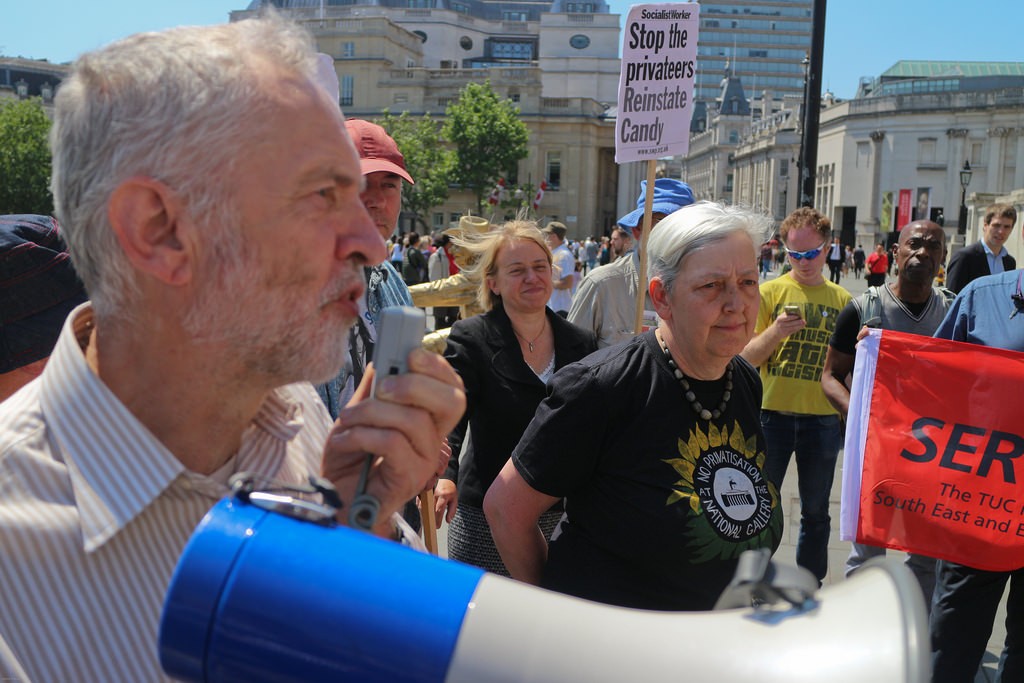
Jeremy Corbyn speaks at a rally to protest the firing of an employee at the National Gallery, June 11, 2015. Photo: Steve Eason / flickr. Used under Creative Commons 2.0 License
Cohen posited that, under Corbyn, the position of Jews on the British Left will be grim. “To be blunt, the new leader of the opposition is ‘friends’ with men who want them dead. One Jewish Labour supporter told me, ‘I feel like a gay man in the Tory party just after they’ve passed Section 28,’” a reference to a controversial amendment passed under Margaret Thatcher that banned teaching related to homosexuality in schools. “Another described his position as ‘incredibly exposed,’” wrote Cohen. “He had ‘come to understand in the last few weeks, quite how shallow the attachment of the left is to principles which I thought defined it.’”
I do not believe that Jeremy Corbyn is an anti-Semite—although, at the very least, the sheer number of anti-Semitic individuals and organizations with whom he is connected calls his moral judgment into question. His associations show him to have been a bloody fool, an ignorant dope, or someone with a malevolent streak and a rotten core. I do not believe that he will ever be Prime Minister, which, in a sense, limits the damage he can do; damage to community relations between Jews and Muslims, the legitimacy of Israel in British public opinion, or to British foreign policy in the Middle East and elsewhere.
Nevertheless, I cannot suppress my fear that Corbyn’s victory represents the final decoupling of Labour from both Israel and the mainstream of the British Jewish community. It may now be a relationship beyond repair. I worry that Corbyn, unable to see anti-Semitism on the Left or the correlation between anti-Zionism and anti-Semitism, unable to even say the word “Israel” at a Labour Friends of Israel meeting, will not take Jewish concerns seriously; concerns not just over the British political climate regarding Israel, but over security for Jewish individuals and institutions.
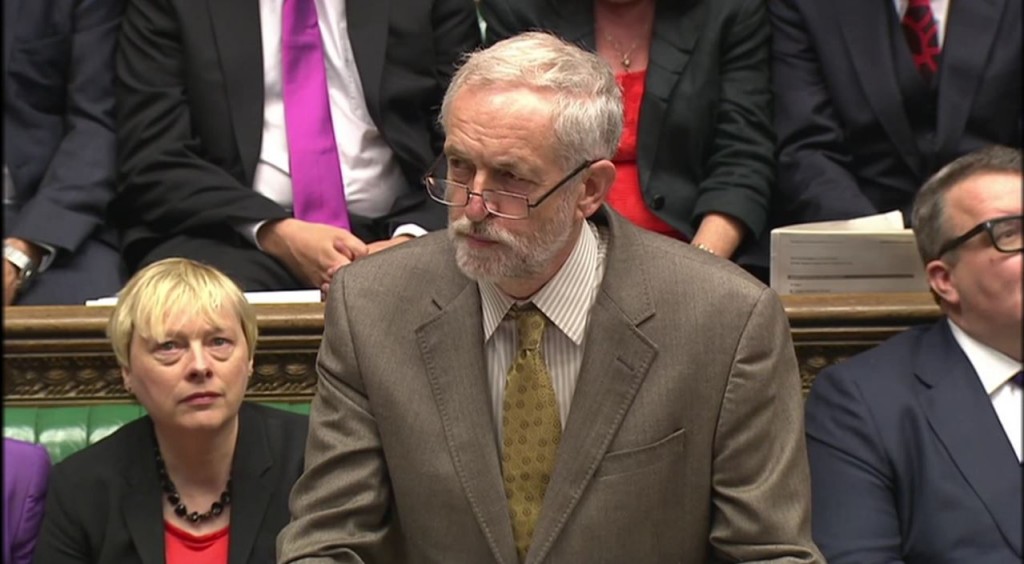
Jeremy Corbyn at his first Prime Minister’s Questions session as leader of the Labour Party. Photo: Channel 4 News / YouTube
Neither can I shake the thought that the nature of his victory and his new status as leader of Her Majesty’s Opposition will give legitimacy to his brand of anti-Israel and anti-Western politics. The notion that Israel, NATO, or the United States are the root of all evil in the world has always existed in British politics, but it lived where Corbyn lived—on the fringe. Now, supporters of Corbyn, half of whom think the United States is the single greatest threat to world peace, and over a quarter of whom believe a secret elite controls the world, are in control and feel empowered by the ascension of their hero to the pinnacle of the Labour Party.
They are a dogmatic bunch, like Corbyn himself, unbending and unwilling to acknowledge, as Jacobson wrote, that “truth isn’t a carpet not a single thread of which dare be removed without the entire tapestry unraveling.” Their anti-Western ideology “is predicated on the presence of a divine unsmiling artificer at the loom, weaving his single truth over and over again. The oppressor’s wrong, weave weave, the wickedness of the West, weave weave, imperialism, weave weave, and our own responsibility, weave weave, for every act of violence directed against us. The Great Banality Carpet woven on the Great Loom of the Single Thought.”
Jeremy Corbyn hasn’t had an original thought since 1983, and I worry that his Single Thought, which is an unreconstructed hatred of Israel and the West left over from the Cold War and barely warmed through for the age of international terrorism, is about to be imposed on a great institution, the Labour Party, destroying it in the process. Those who, like me, care deeply about British liberal and social democratic values, liberal internationalism and universal human rights, and the place of Zionism on the political Left should start worrying, too.
![]()
Banner Photo: Steve Eason / flickr






